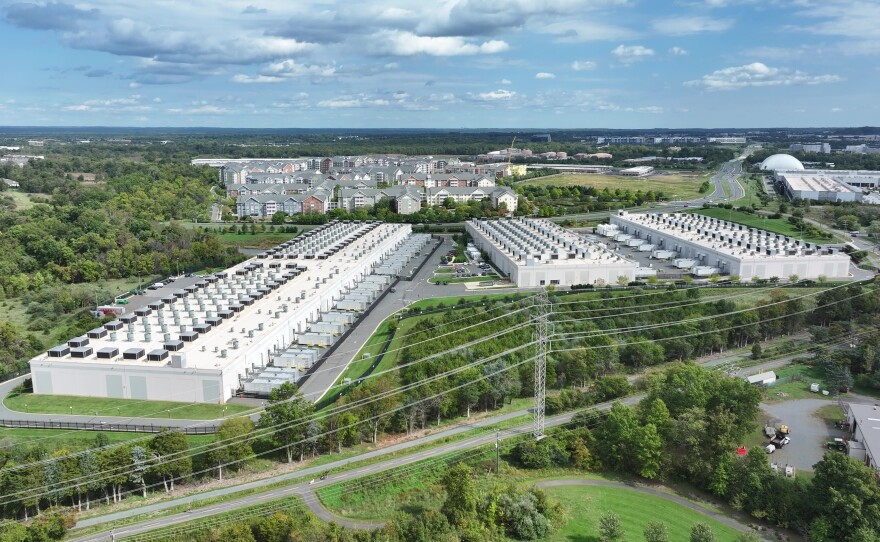Much of today’s computing is done in what’s called “the Cloud.” Cloud computing runs through hundreds of massive buildings located here in the Commonwealth. We explore how Virginia became the hub for handling most of the world’s internet traffic and what that means for the state.
TRANSCRIPT OF VIDEO
TRANSCRIPT OF VIDEO
ADRIENNE McGIBBON: Data centers are the brains of the internet and an essential element of our growing reliance on technology.
ALLISON GILMORE: Because Northern Virginia is the hub of data centers in the entire world, so much data travels through this area.
ADRIENNE McGIBBON: Allison Gilmore is vice president of the Data Center Coalition, which represents the industry.
ALLISON GILMORE: From our smartphones and our gaming services all the way to our refrigerators and our vacuum cleaners and our doorbells, all of those innovative tools that we use in our personal lives and in the professional world are all powered by data centers.
ADRIENNE McGIBBON: And it's not just our personal devices, businesses, government agencies, emergency services and healthcare providers all rely on data centers. Virginia’s Loudoun County has led the way for data center development.
BUDDY RIZER: We jumped in early, and since then it's been a really good ride for us.
ADRIENNE McGIBBON: Buddy Rizer is in charge of economic development in the county. He says those data centers account for a third of Loudoun County's annual budget.
BUDDY RIZER: This year, we'll get about three quarters of a billion dollars in local tax revenue.
ADRIENNE McGIBBON: Many of the companies that own and operate data centers are among the most recognizable names in tech today. Amazon, Microsoft, Apple, Google, and Meta.
BUDDY RIZER: There's nothing out there that we've ever seen that generates the tax revenue that a data center does.
ADRIENNE McGIBBON: That money pays for schools, parks, and infrastructure, and it allowed the county to lower its residential tax rate by 32% over the last decade.
BUDDY RIZER: We have about 31 million square feet right now with another 4 million that's currently under development, and we'll probably top out around 40 million square feet or so.
ADRIENNE McGIBBON: It's not just space that's limiting growth. Energy usage is a factor as well. According to the US Department of Energy, a typical data center consumes 10 to 50 times the energy per floor space of an average office building. That usage is putting a strain on the local electric grid.
BUDDY RIZER: We were taxing the infrastructure, the electrical infrastructure, to a point where we needed to make major upgrades and we've been working with Dominion on making those upgrades and have worked very hard to to be thoughtful about how we do it.
ADRIENNE McGIBBON: In 2022, Dominion Energy put a pause on providing power to new data centers in Loudoun County's Data Center Alley. To keep up with soaring demand, Dominion plans to rely on existing natural gas and coal power sources which could impact its ability to meet legally mandated clean energy goals by 2045.
JULIE BOLTHOUSE: Data centers want to build now. They're in a competition to build out, to meet this AI desire, so they're in a race to build out as fast as they can, and they want that power as soon as they can get it.
ADRIENNE McGIBBON: Environmental advocates like Julie Bolthouse acknowledge that companies that own data centers are top supporters of the clean energy economy, but she says the industry isn't contributing enough to offset its use of fossil fuel energy.
JULIE BOLTHOUSE: Yes, they are the biggest investor in solar in Virginia, but they're not even close to meeting the energy demand that they're actually placing on the grid.
ADRIENNE McGIBBON: Bolthouse points to other concerns about air quality impacts from diesel generators and water usage to cool equipment.
JULIE BOLTHOUSE: We're building more data centers than anywhere else in the world, but yet our standards are far behind all these other places.
ADRIENNE McGIBBON: Citizens are also voicing growing outrage about proposed data centers in their towns.
SPENCER SNAKARD: Dominion was proposing these 110-foot-tall steel, power towers that were going to be coming right through my property.
ADRIENNE McGIBBON: Spencer Snakard built her dream home on the edge of Prince William and Fauquier Counties, and joined a community group that fought off a proposed data center which would've meant clearing part of her land to run electric lines to power the structure.
SPENCER SNAKARD: Many people like me would be threatened by having these power lines coming through their property, not only losing the beauty and the peacefulness and the essence of what they bought the property for, but also losing property value.
ADRIENNE McGIBBON: Despite pushback from concerned citizens, Virginia is expected to double its number of data centers by 2028. Rizer from Loudoun County urges developers and localities to plan for that growth.
BUDDY RIZER: We need to, as a society, be able to manage that, get them in the right places, and do the right things with them and put them in the right positions to succeed.








